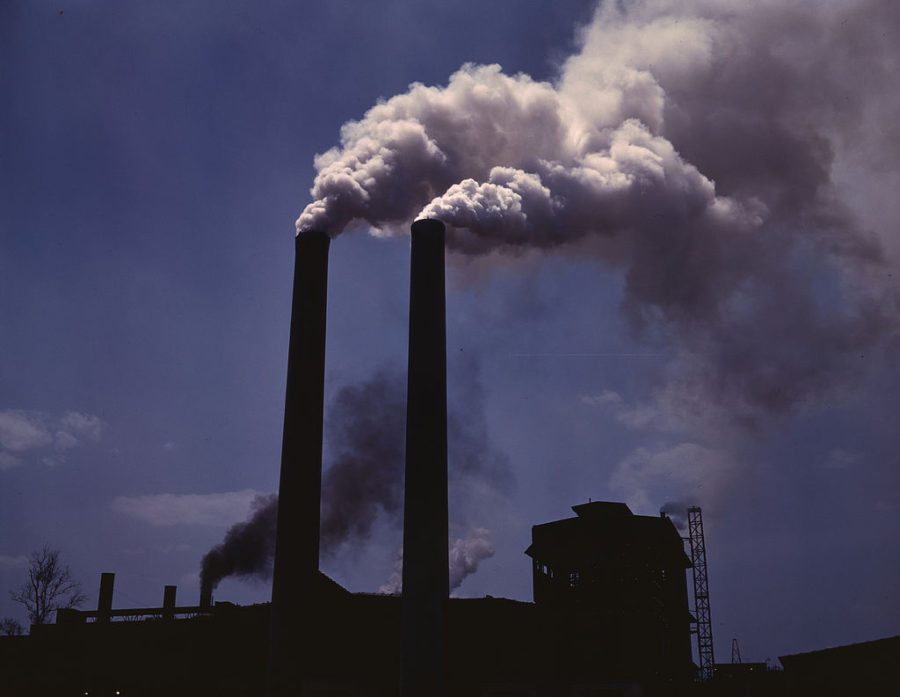Scientists weigh in on Anthropocene in Iowa
pollution.jpg
March 14, 2017
Environmental advocates argue that we are in the midst of a new epoch called the Anthropocene, although geologists haven’t confirmed it as a new epoch.
The Anthropocene is a relatively new word within the science industry that has gained global attention in the 21st century, even though the term was introduced in the 1970s.
The Anthropocene is known as the period during which human activity has had the most dominant influence on climate and the environment.
Environmental advocates argue that although the term hasn’t been officially recognized as a new geological era, there is still reason to believe the Anthropocene began as early as the Industrial Revolution.
Today’s attention toward the term is focused on whether there is factual evidence to support the new epoch or whether it’s just an eye-catching word scientists can use to spark public interest in the ever-changing environmental state of the world.
The phrase “sixth mass extinction” also has been used to describe our present time on Earth.
Regardless of whether the term Anthropocene becomes official in naming a new epoch, Arne Hallam, professor of economics, argues that the term still has relevant implications behind it.
“It’s still going to be clear that the geological record that’s left on the Earth has a much bigger influence of humans,” Hallam said. “[Anthropocene] is a useful term to imply man’s existence on the Earth as having a big effect.”
Kathleen Hunt, assistant professor of agricultural communication, argues that the terms Anthropocene and sixth mass extinction give trends credibility.
“I do think there’s evidence to support the sixth mass extinction,” Hunt said. “I mean the evidence for biodiversity loss and climate change has been long-standing.”
Hunt acknowledged the buzzword effects of the terms as an advantage because they spark interest in the issues.
She did, however, suggest that sixth mass extinction has a stronger impact than Anthropocene at sparking interest.
Hunt recently wrote an article titled “Diving into Food Justice: Food Waste in the Anthropocene,” which outlines a teaching module for studying the idea of the Anthropocene in an English class.
Students outside the realm of science-based majors won’t often hear of these terms. The class module allows for students to develop an understanding of the tensions between food and the environment in the age of the Anthropocene.
Shakira Stowers, senior in animal ecology, argues that the Anthropocene and sixth mass extinction are terms more people should be aware of.
In regard to the sixth mass extinction, Stowers said people aren’t aware of the degree of the extinction, or they simply deny the idea.
“Some people think we’re discovering new species, but really it’s just because maybe more habitats are being destroyed and they’re vulnerable and out in the open so they’re easier to discover,” Stowers said.
Diane Debinski, professor of ecology/evolution and organismal biology, also argues that species are increasingly becoming endangered because of the negative impacts that humans have on the environment.
In Iowa specifically, Debinski has noticed a lack of monarch butterflies.
“We’re changing plant communities pretty significantly,” Debinski said. “When a butterfly flies around looking for the plants it evolved with and it finds corn and soy beans or Kentucky blue grass instead of a native prairie grass, how does it respond?”
Debinski attributes the substantial modification of the Iowa landscape as a major issue in dealing with maintaining a diverse array of species.
When dealing with the issue of the Anthropocene, policies enlisted by President Donald Trump could be important in benefiting or harming the environment.
Trump has mentioned that he wants to cancel billions of dollars in payments to U.N. climate change programs, continue the construction of the Keystone Pipeline and Dakota Access Pipeline, lift the restrictions on the production of American energy reserves including shale, oil, natural gas and coal, as well as significantly reduce funding toward the Environmental Protection Agency.
James Raich, professor of ecology/evolution and organismal biology, doesn’t expect Trump to be a friend to the environment.
Raich views the idea of lifting restrictions on the production of American energy reserves as a “consume now, screw the future” philosophy.
Raich also believes that the EPA should be a well-funded organization, especially considering the Anthropocene and sixth mass extinction as legitimate concerns during the 21st century.
“I think that the Constitution guarantees we the people the right to life, liberty, and the pursuit of happiness, and the pursuit of happiness is impossible in a sick, toxic environment,” Raich said.
Maaz Gardezi, Ph.D. student in the sustainable agriculture graduate program, remains optimistic that there will be movement on the ground that will push people to work on issues relevant to the environment.
Gardezi, however, is concerned with the possibility of retracting funding from the EPA, as it will “reverse all the progress that has been made.”
With the idea of the Anthropocene and sixth mass extinction floating around during the time of a Trump presidency, Gardezi encourages students to remain involved and hungry for change.
“In terms of being more politically active, call your representatives and tell them to support pro-environment policies,” Gardezi said.
In regard to facing environmental problems during a Trump presidency, Hunt said, “I think there is a good fight ahead. I appreciate the resistance and social movements that have popped up since the election. I’m motivated and inspired by those kinds of activities.”







